

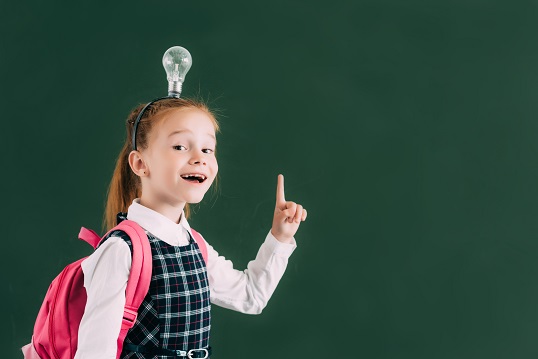
This page is a sequel to the "Ideas for Projects" page of children who participate in the EFK program and of teachers who teach this program in school.
During the Entrepreneurship for Kids Program, numerous project ideas emerged, some of which were successfully actualized, while others were not. In light of the abundance of ideas that arise during the program, we have included on this page additional project ideas, inventions, and social initiatives within the school. Most of these are from students, while some are from teachers.
The process of filtering ideas is complicated because, like real entrepreneurs, students often like the ideas they come up with, and they find it difficult to decide not to pursue ideas they have thought of.
But with a structured and objective process, based on questions, gathering information, and thinking about details, the students can prioritize the ideas that arise in the classroom.
In a class that allows an open and creative atmosphere, many project ideas are formed, from which a limited number of ideas are promoted.
Read about the realization of the selected projects on the page: Kids initiate.
18 Ideas for Projects by the Katznelson School Students
Sixth graders at the Katznelson School attend entrepreneurship classes led by their art teacher, Lee Glick. The students identified needs and problems and thought of 18 creative solutions for ventures. They prepared presentations and models to illustrate their ideas.
They were introduced to Galit Zamler, as well as to a German delegation of Teachers of the Future, who were excited by their ideas.
The children identified needs by asking questions and then came up with solutions. Here are a few examples.
Question 1: Have you ever slept outside at night and had to save space?
Solution 1: Shampbrush is a hairbrush with a handle containing soap, shampoo, and conditioner.
Question 2: Have you ever wished your back didn't hurt after prolonged sitting? Did you discover that you weren't upright and wanted to be?
Solution 2: SmartChair - a chair with advanced technology that allows the back of the chair to be individually adjusted for every position.
Question 3: Have you ever wanted to turn on an electrical appliance, but when you plugged it in, there was an explosion or a small fire, or a short circuit in the house?
Solution 3: Elecsen - A device that sends you an alert if it detects a faulty electrical item.
Question 4: Have you ever had a hand ache that prevented you from writing?
Solution 4: An automatic pencil which can also be used as an eraser. You can record speech or scan content and then automatically write on a page, setting the language and font.
Question 5: Have you ever woken up and had no energy to make coffee or chocolate?
Solution 5: A device that is both an alarm clock and a coffee/chocolate maker
Question 6: Have you ever wanted to see something in 3D before you bought it?
Solution 6: P.E.P.H. power energy phone hologram - a device that allows you to see the desired product in hologram form.
Question 7: Have you ever bought a new pair of shoes and come home with a mud stain that barely removed?
Solution 7: A transparent shoe cover protects shoes from dirt and can be easily removed.
Watch the presentation to see all 18 ideas. (In Hebrew)
Students of the North Star in Ashkelon
Four fifth-graders at the North Star School in Ashkelon, led by Sarry Plum, participated in a 13-session entrepreneurship course led by Galit Zamler.
At the end of the course, we held a young entrepreneurs conference. The conference illustrated what was learned in the course: Environmental awareness helps identify needs that require creative solutions.
The students presented their ideas in an entrepreneurial pitch style to fourth graders after learning that a pitch is a concise presentation of an idea designed to arouse interest among the listeners.
The pitches were accompanied by models they prepared themselves to illustrate the ideas. Additionally, each team displayed a beautiful sign that outlined the steps in developing the ideas, including the name of the idea, the target audience, the need it addresses, how they conceived the idea, and what is required to implement and market it.
In this process, the students learned concepts from the entrepreneurship domain, demonstrated creative thinking, collaborated in teamwork, gained confidence in speaking in front of an audience, and experienced a sense of ability and proactivity.
Well done!
Here are some of the ideas the students came up with:
The idea of Adi, Roy, Miriam, and Abigail: A carriage - an autonomous electric stroller that can drive the baby
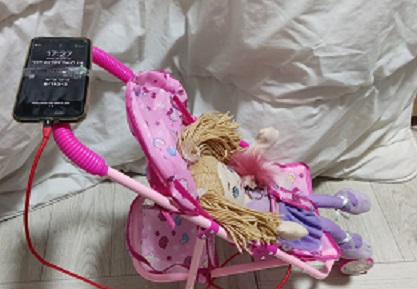
The idea of Adam, Leon, Liora, and Shoham: Sensitive shoes - shoes that have a stinky odor sensor, and it helps not to step on dog poop
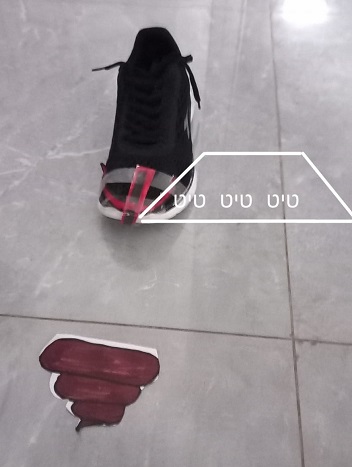
The idea of Michelle, Jasmine, Nika, and Melanie: Tikta - a bag that has a trash can for people who travel in nature, so they will not throw away garbage and pollute the environment.
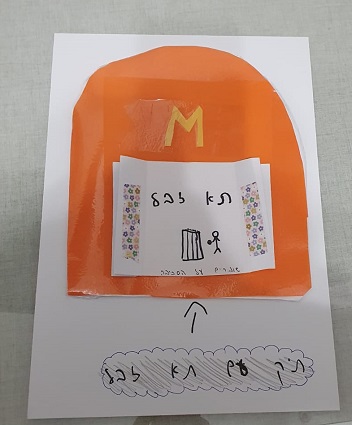
Stephanie's idea: a warning shoe - a sensor in a shoe that beeps when something strange is in front of us. It is especially suitable for people with disabilities or dog owners who do not notice what is in front of them.
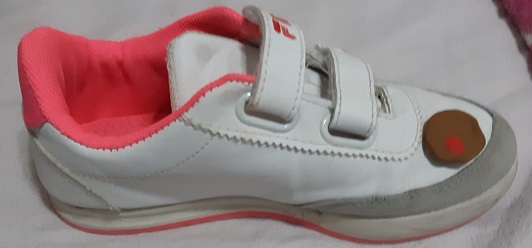
Alekr is Noa, Nathaniel, Adam, Yellin, and Liav's idea - an underground pipe that sucks all the garbage into a mountain of waste, thus saving garbage trucks from having to cross the streets.
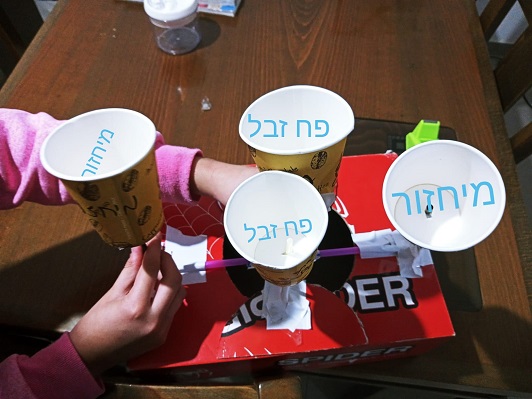
The idea of Nathaniel and Michael is autonomous electric garbage cars and trucks that pass between buildings and collect garbage without a driver.
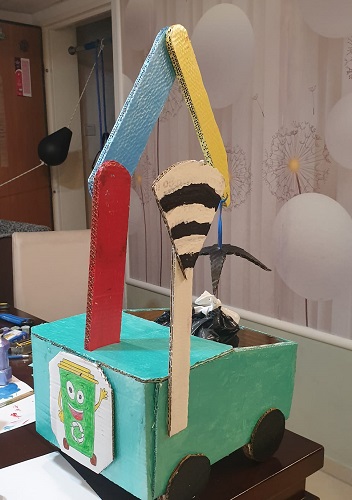
Lisa, Tal, Jonathan, Ron, and Sofia come up with the idea of a Translator - a pen that can translate any language, along with a screen for people who are deaf or hard of hearing to see what is being said.
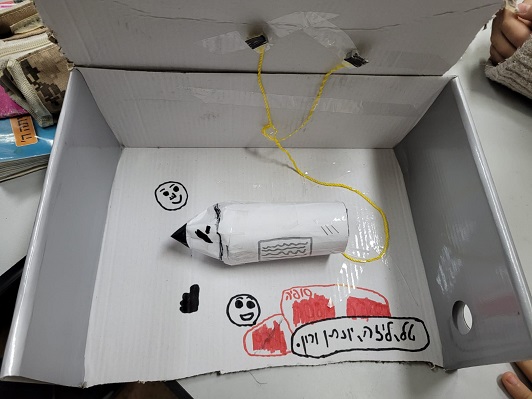
Thaya and Evelina's idea: short and long for the price of one - a shirt with sleeves that have zippers, allowing you to shorten or lengthen the sleeves easily.
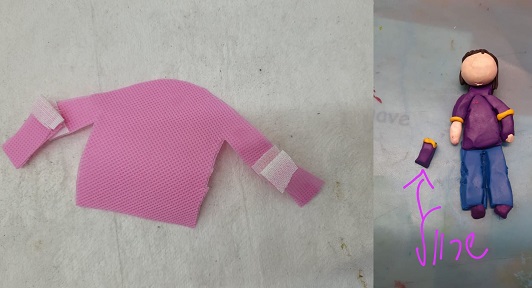
The idea of Bar, Yellin, Shachar, Yahli, Hila Maya, and Emily - Song Stoller - a remote for a baby stroller to play relaxing music
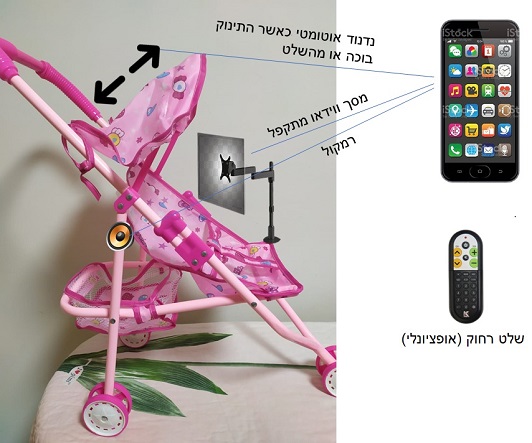
Lenard, Lior, Danny, Stephen, Sean, and Igor's idea: AutoCart - a shopping cart that picks up the products from the shelves for you.
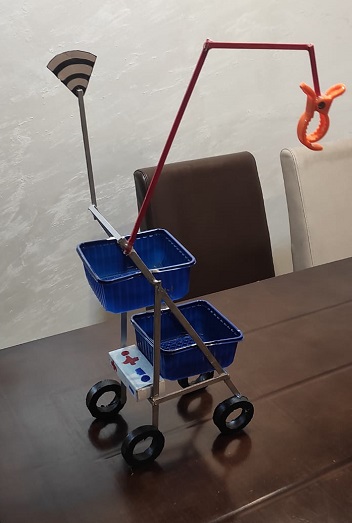
Yuval, Daniel, and Zohar's idea: an electric car shaped like a mouse. Such a vehicle, on the one hand, helps combat global warming. On the other hand, it is more aerodynamic and futuristic. It suits the rich who love gadgets.
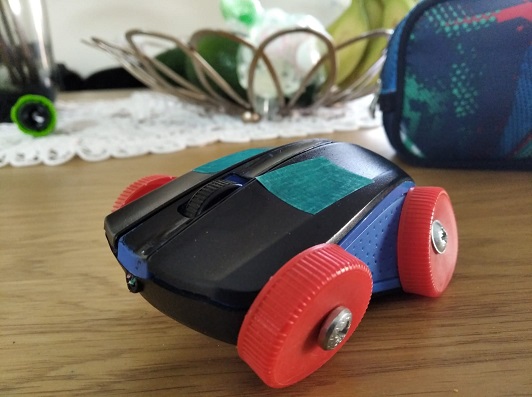
The idea of Linoy, Aliza, Emily, Shoham, Daria, and Valeria: A puppet board - a game board of a puppet house, made entirely of paper. It combines fun and creativity and is especially suitable for breaks during school.
Paper puppets made by fifth-graders
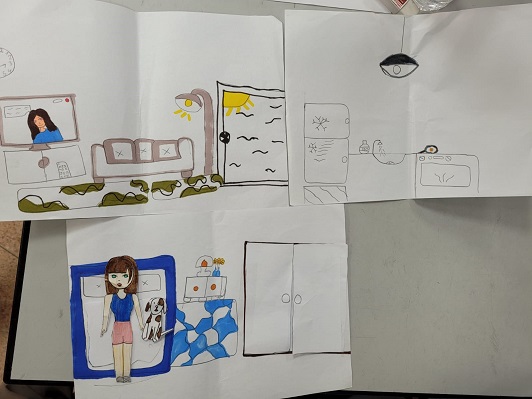
Students from Haifa's Tchernichovsky Elementary School
Four teams of students from the Tchernichovsky Elementary School in Haifa, headed by principal Doron Wienberg, competed in an international entrepreneurship program against groups from China.
The students were presented with innovative projects in various fields. Ultimately, they presented their ideas in English to a panel of judges.
Michael, Yan, and Guy's project is called "MAGIC TRASH," and its purpose is to encourage children through their game to sort out the trash and keep the environment clean.
Ron, Nathan, and Yoav's project is called "KFK-KIDS FOR KIDS," and it aims to strengthen children from Israel mentally and all over the world in times of distress, mainly due to wars.Ron, Nathan, and Yoav's project is called "KFK-KIDS FOR KIDS," and it aims to mentally strengthen children from Israel and all over the world in times of distress, mainly due to wars.
Ofir, Linoy, Tali, and Noa named their project "Technology Adventures" to help older people navigate computer-related tasks enjoyably and engagingly.
The invention of Ron, Kenya, and Ido is called "Medical Bottle." It is a bottle that eases us from taking pills since the pills are placed together with a bottle of water.
Fifth-grade Students at the Sadot School in Pardes Hanna Karkur
Leona, Shoham, Sivan, and Tahel from the 3rd grade at the Sadot School in Pardes Hanna Karkur participated in the first virtual hackathon for Israeli students.
The idea that the entrepreneurial children developed during the hackathon is called CIP - Connection in Play.
The idea in one sentence: "Keep in touch with family or friends through games during a lockdown."
And the explanation at length: "Our project is basically a site that allows you to play while talking with relatives and friends.
The site has a selection of games that can be played. The project aims to stay in touch with older family members, such as grandparents, and maintain friendships.
Another option is to have a group meeting. Not only can two play, but three and four."
Or and Mia Magen from sixth grade at the Katznelson School in Kfar Sirkin
Or and Mia Magen are twin siblings in the sixth grade at Katzenelson School in Kfar Sirkin, and they also participated in a virtual hackathon for students.
Or and Mia called their project "Mitkaplet" - a combination of the two Hebrew words "bed" and "folding".
This is not just a folding bed, but a bed that folds into a wireless wheelchair, controlled by a remote.
The participants in the hackathon were excited to hear how the idea was born: "We thought of this idea because our grandmother has lower-limb paralysis, and this product can make her daily life easier, and so it could even benefit many others."
The young entrepreneurs defined the goals of the project as such:
1. Relieve people with leg paralysis.
2. Save the use of machinery and human resources for lifting people with disabilities.
3. Allow disabled independence and full wheelchair access.
Kim and or from the Third Grade at the Ilanot School in Ashkelon
Kim and Or, third-graders at the Ilanot School in Ashkelon, participated in the virtual hackathon for students.
Their project is A 'feeling good' video for Corona patients.
The young entrepreneurs defined the project's purpose as such: "Help children who are not feeling well to feel well."
The idea came up after "I thought about the sick kids, and I wanted to make them feel good."
According to them, "What is unique about our project is that we want to do everything wholeheartedly."
They plan to market the venture in the following way: "I will turn to those I know and tell them about the project, and they will pass it on, and that way, I will find children with coronavirus, and I will be happy and make them feel good."
They presented their pitch as follows: "Following the Coronavirus, people are isolated at home and are probably bored, so we decided to shoot funny and exciting videos on YouTube so that both children and adults will see these videos and feel better.
We will send these videos to doctors and tell them to show these videos to sick people."
Orian and Peleg From the Sixth Grade at the Katznelson School in Kfar Sirkin
Orian and Peleg from 6th grade participated in an online hackathon for students with an idea for a project called JusTouch - Disposable Hand Covers.
They explained the idea for their project that way: "When we get back to routine, a lot of people will be anxious about getting infected with bacteria.
JusTouch will be installed next to elevators and doors. As soon as one touches the product, the front of the hand is wrapped in thin plastic, allowing one to press elevator buttons, open doors, and so on.
A recycling bin will be installed outside each door/elevator to allow a clean environment to be maintained despite using nylon."
Maria and Anna from the Fifth Grade at the Northern Star School in Ashkelon
Maria and Anna participated in the coronavirus national hackathon for students, and the project they conceived is called "Together we will win CORONA!!!"
The entrepreneur girls defined the project in one sentence: "In our project, we help people with psychological stress."
The entrepreneurs planned to help people navigate the loneliness period through phone calls, offering psychological support.
Fifth and Sixth-graders at the A.D. Gordon School in Holon
Gon, Shira, and Rotem from the fifth grade, along with Aya, Noa, and Ziv from the sixth grade, formed an entrepreneurial team and participated in the national hackathon for students.
Their project is called Quarantine Together.
The idea is to "Create a site that will open Zoom meetings according to interests and ages.
The site will be divided into various topics, including creative work, fitness, dance, and more.
When people want to talk, they can start a Zoom call from the site, and people can go in and talk to people about common interests."
The entrepreneurial students identified a need for people to connect with others during the lockdown period.
After conducting an online brainstorming session, the students generated this idea and concluded that loneliness is a problem they can address.
According to the young entrepreneurs, their project's advantage over others is that "Our venture includes more topics. It is more accessible and more operational."
Zohar and Yaara From 5th Grade at the Katznelson School in Kfar-Sirkin
Zohar and Yaara participated in the online Hackathon for students about "dealing with the coronavirus."
Their idea for the project is called Corona-diary.
The entrepreneurial girls explained how they came up with the idea:
"The idea was born from the fact that one day we got tired of sitting in isolation, without going out of the house, so we decided to make the corona diary for writing about our life in quarantine. In case we have good days, we could write about them and repeat them.
Besides, we decided to draw our good moments while in isolation, so we could show others what can be done while we are at home, have fun, and not get bored even though we can't meet up with friends, travel, or even go out of the house.
We tried out the system, and it worked! We're no longer getting bored at home, and we have plenty to do, so we decided to publish it."
Six Students From 5th and 6th Grades at the A.D Gordon School in Holon
The 5th-grade young entrepreneurs, David, Nicole, and Tahel, and the 6th-graders, Orin, Shaked, and Nadav, at the A.D Gordon School in Holon won second place in the national virtual contest for entrepreneurial students.
The entrepreneurship team's idea is called Active-Journal. It is a website that gathers a variety of activities by interests and ages.
The need that the project meets: "Our venture provides a solution to loneliness. We're presenting several options for activities to pass the time in a fun and enjoyable way".
The young entrepreneurs explained how they thought about the idea: "The idea was born when a girl from our team offered to build a website that combines a few games for passing the time.
We thought it already existed, but after we all started thinking about ways to improve this idea, we felt satisfied with it, and here it is!"
Watch the pitch of the young entrepreneurs:
Yotam and Omer from Katznelson School in Kfar-Sirkin
Yotam, from sixth grade, and Omer, from fifth grade, are very creative. Thus, while participating in the national virtual Hackathon for students, they came up with two ideas:
They called the first venture UNOISER. It's a chair that you can swing on without making any noise when it comes to rest.
They explain how they came up with the idea: "I was in my classroom in one of the lessons, and there was a task that required focusing, and I began swinging. When I landed, many kids commented on the noise of the chair's landing, which made it harder for them to concentrate, and that's how I came up with the idea."
The second venture they called Takeaway.
They considered a trash can with wheels connected to an app, so you wouldn't need to leave the house to dispose of the trash.They thought about a trash can with wheels connected to an app, so you won't need to get out of the house to throw away the trash.
The way the idea arose implies on their environmental awareness and the ability to recognize opportunities and to imagine: "I went for a walk with my dog, my brother and my mother, and suddenly we saw a big trash can, and I thought that if it won't be possible to get out of the house or if someone lives in a place with a lot of infected people, how could he throw away the trash? That's where the idea came from."
Both of the young entrepreneurs built a model of the idea:

Students of the 5th Grade in the Northern Star School in Ashkelon
Students from the four 5th-grade classes at Northern Star School in Ashkelon, led by Sarry Plum, participated in an entrepreneurship course instructed by Galit Zamler.
The students underwent a process of exposure to various types of ventures.
During the course, an atmosphere of openness and creativity was created in the classrooms.
After that, the kids came up with ideas for inventions. Some of them intended to upgrade existing products, while others considered social projects.
Here are the ideas that made it to the finals, those that the students decided to promote:
- Reminder - an app with a device that is installed near the door. We enter what we need to remember into the app, and the device reminds us of it.
- A collar that locates pets that have gone missing.
- A pencil that is also a pen that works on batteries and can also be charged.
- An ice cream truck that supplies every flavor we want.
- Shoes that, when losing balance, two poles come quickly out of the sides and hold the child.
- Small gummy poles that are attached to the phone, so when the phone falls, they come out quickly and prevent it from breaking.
- A bag with buttons/switches: One for Bluetooth music, the second for a back massage, the third makes the bag easy to carry, and on top of that, there's a straw that comes to the mouth, for drinking.
- A sponge ball that has pieces of sponge inside of it, that fill in the places where the ball gets torn.
- Shoes with a distress button
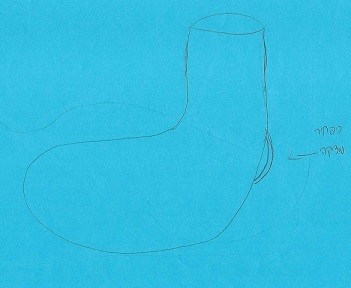
- A glowing trash can on batteries.
- A cloth that folds itself.
- A stroller/cart with a charger that charges the phones and has a pocket to hold the phone.
- A shopping cart with a wheelchair and an umbrella.
- Glasses with a snorkel that filters oxygen and so allows staying underwater and breathing normally.
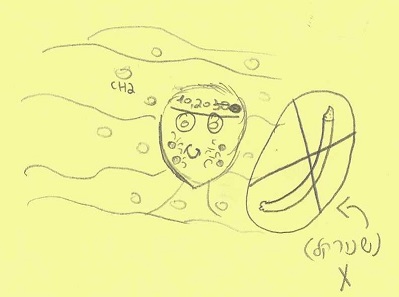
- Autonomous airplane that flies itself for blind people.
- A robot that cleans the house and does the homework for you.
- A typing machine with built-in buttons: pressing a button and saying aloud what we want the machine to write, and it'll write it according to our handwriting.
- A toothbrush with toothpaste in it. Pressing a button gets the paste out for brushing.

- A car that has a chair inside with a bag of medicines for disabled people.
- A small room for napping at school.
- A drink that tastes like Coke but is healthy, with no caffeine, sugar, or preservatives.
- A pencil with a sharpener.
- Tools that are used with water and that can have the water recycled for further use.
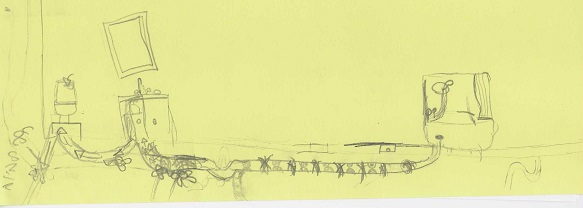
- A laser cannon to spare ammunition and the enemy soldiers, so that the war would be less deadly.
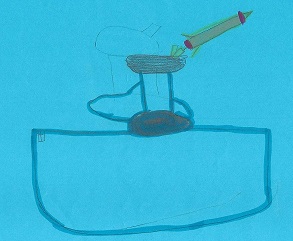
- Stickers for shoes so we won't slip.
- A small bag attached to the coat so we won't have to carry it.
- A glass that can be attached and detached from the plate, so we won't have to hold the plate and the glass separately.
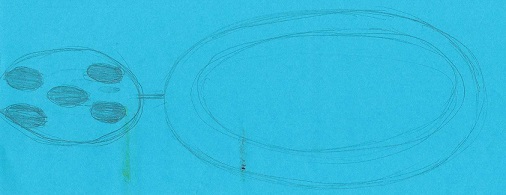
- A toilet sits warmer.
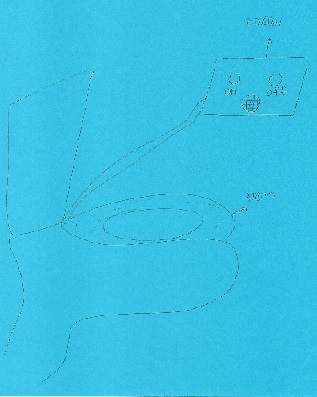
- A cell phone with an umbrella that protects it from the rain.
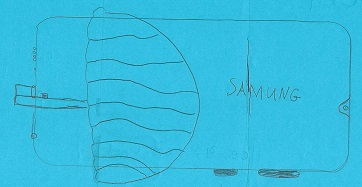
- A warmable towel.
- A laser gun that has a special, different shape.
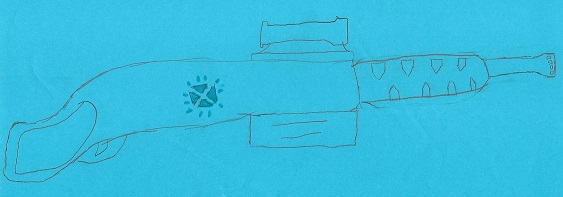
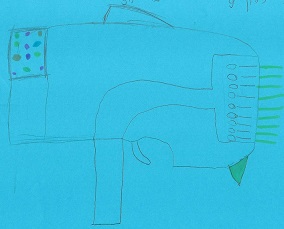
- Using games that kids like for studying purposes.
- A friendship bench at school. If you have no one to play with, then by sitting on the bench, friends would notice and come to play with you.
- A school for Fortnite, we'll earn a lot of money, and we'll help others to get first place in the game.
- Shoes that will make walking faster and easier.
- Sunglasses with ventilators.
- Glasses in which we can change the number (eyeglass size) easily.
- Shoes with GPS.
The students at the Yitzhak Navon School in Shoham are participating in an annual entrepreneurship course based on the EFK program.
Galit Zamler met with the students, heard their ideas for projects, and provided them with feedback on how to move forward.
The students had many creative ideas, some of which are:
A suitcase that warms the clothes. The idea was born out of the need of one of the children on a trip to Thailand.
Add a thermometer to a spoonful of soup, a cup of coffee, and a duckling to the bath so that we can avoid burns.
A cutting tray with a saucer so that the residues of the vegetables and fruit can be drained straight into the saucer.
A machine for feeding pets. The device will be computerized, allowing it to program the amount of food it will give the pet according to its type and size.
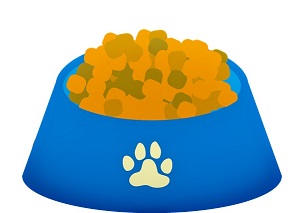
A solar shield cover for a cellular phone that protects the screen and charges the phone simultaneously.
A machine that inflates balloons, like a coffee machine. Suitable for water games.
A sock with cushions, so that the shoe feels more pleasant.
Special shoes for short people to help them reach the hoop while playing basketball and trying to score a basket.
A flying chair for people who use wheelchairs, so instead of pushing the chair, it will just fly in the air.
A pillow with an alarm clock to wake you up in the morning.

Sixth-graders at the Katznelson School in Kfar Sirkin
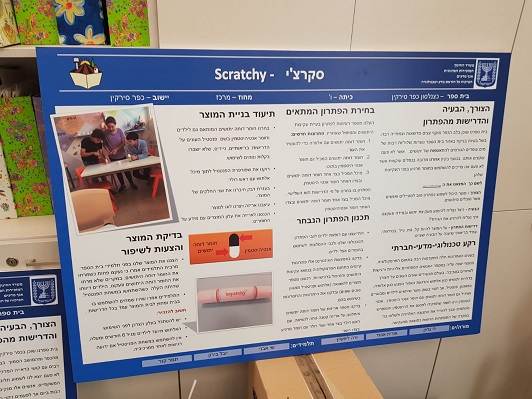
Sixth-graders at the Katznelson School in Kfar Sirkin learn entrepreneurship classes with teacher Lee Glick.
The students focused on a common problem of mosquito bites, so they decided to solve it.
The children studied various methods for removing mosquitoes and examined some of them.
In the end, they chose a mosquito repellent solution suitable for children, combined with other elements to create a product that can be easily carried and used on hikes.
The product is named Scratchy.
Another Idea from Another Group of Students - Magnoclean
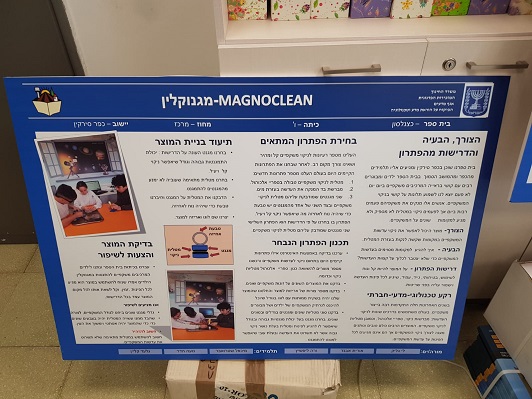
The idea for the Magnoclean product arose from the need to clean the corners of their glasses.
The students sought a convenient, easy-to-use, safe, portable, and durable solution that would protect the lenses from scratches and clean the lens corners.
After several ideas were presented, the children selected a product featuring two magnets with a cleaning cloth on one side and a ring on the other, providing a comfortable grip.
The Staff of the Yitzhak Navon School in Shoham
The staff of the Yitzhak Navon School participated in an institutional training course on the subject of education for entrepreneurship, led by Galit Zamler.
The teachers attended a practical workshop on creative thinking and generating project ideas.
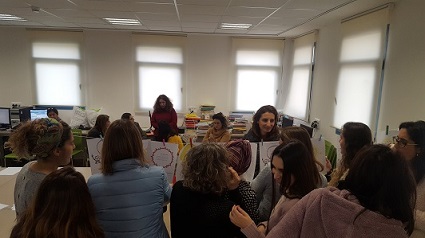
After the teachers were exposed to different techniques in creative thinking, they were divided into groups, each of which raised ideas for projects, such as the following ones:
- Establishing a supermarket where one can buy a few groceries without leaving the car, from a drive-thru window, similar to McDrive.
- Alerting a mobile phone if it is being used before crossing a crosswalk.
- Integrating pensioners as an auxiliary resource in schools
- Cleaning the classroom by using robots.
- An app that allows parents to protect their kids on social media.
- A garbage can that contains multiple trash bags and is ready for use right after removing the previous, full trash bag. This idea was also proposed by students from Kiryat Arba who participated in the Hackathon: removable trash bags that do not require replacement.
- Shopping carts can be folded into the car trunk and pulled out like wheelchairs.
- Giving lectures online by the teachers and watching them on smartphones.
- A motorized shopping cart with a chair and screen to load into the shopping list.
- An autonomous barrier at the crosswalk, which identifies children who want to cross the road and stops the traffic for them to cross safely (instead of or in addition to the Zaha"v patrols).
The teachers teach the students the Entrepreneurship for Kids Program, and in the process of raising ideas for projects, some of the ideas that came up included:
- A water balloon tying machine
- A flying skateboard
- A food cutting device with finger protection
- A phone protection device
- A whiteboard that automatically cleans itself
- "TickSkate" (Tick means bag in Hebrew) - instead of a trolley to carry backpacks, a remote-controlled trolley that you could put your bag on it.
- A notebook that can turn into a pillow
- An autonomous eraser
- A robot that can teach students instead of a teacher
- A bottle that knows how to remind us when to drink
- An automatic curtain shutter
- Deodorant for dogs
- A notebook with a button that records and writes
- A water-resistant book
- A globe that shows information about a country in 3D by tapping it
- A social project - diaper donation for babies
- A social project - collecting second-hand products and delivering them to needy families
You can read about many more ideas for projects undertaken by children in entrepreneurship classes.
You can also read about the realization of selected projects on the pages' Kids Initiate Part I ' and 'Part II'.